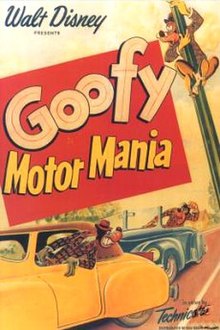Motor Mania
| Motor Mania | |
|---|---|
 Motor Mania poster. | |
| Directed by | Jack Kinney |
| Story by | Dick Kinney |
| Produced by | Walt Disney |
| Starring | Pinto Colvig |
| Music by | Paul J. Smith |
| Animation by | John Sibley Charles Nichols Ed Aardal Jack Boyd |
| Layouts by | Al Zinnen |
| Backgrounds by | Claude Coats |
| Color process | Technicolor |
Production company | |
| Distributed by | RKO Radio Pictures |
Release date | June 30, 1950 (USA) |
Running time | 7 min (one reel) |
| Language | English |
Motor Mania is a cartoon released by Walt Disney Productions on June 30, 1950.[1] In this madcap motoring animation, Goofy (during his "Everyman" period) transforms into a Mr. Hyde-type split personality, when he gets behind the wheel and provides the lowdown on how to not drive safely.[2]
Plot[]
The cartoon shows how the character, as the pleasant, friendly, and good-natured "Mr. Walker" who "wouldn't hurt a fly nor step on an ant", undergoes a change in personality to the violent "Mr. Wheeler" when he gets behind the wheel of his yellow car. As Mr. Walker he's polite, safe, and good-natured while as Mr. Wheeler; he is very mean, reckless, and predatory. Upon reaching his destination in town (we are not shown the character's reason for traveling) and leaving his automobile, he reverts to the mild-mannered Mr. Walker, whereupon he is the victim of other motorists' unsafe (and sometimes even predatory) driving habits. However, once he returns to his car, he becomes Mr. Wheeler again, seeking to impose his own will upon traffic, to the point of blaming the tow truck which hauls him away for his slow pace after his own auto accident, and breaks the fourth wall by telling the narrator, while educating him (and the fourth wall) on safe driving habits with, "Ah, shut up!"
The car[]
The car that Goofy drives is a yellow Lincoln-Zephyr convertible. Although not every detail is correct on the cartoon car in relation to the original, its deep, growling sound is unmistakable.
Historical significance[]
- This is first Goofy cartoon to have Goofy redesigned, with a lack of both floppy external ears and frontal teeth. It was also the first to use a jazz remake of the theme song used in Goofy shorts prior.
- Was used as an army commercial film in 1955.[3]
- This cartoon reveals that road rage is not a recent phenomenon, but also an issue recurring with each generation of drivers.
- Due to its subtle topicality, it and two 1965 Goofy cartoons about freeway safety, and , have been shown in driving schools across the continent.
- This short was awarded the Buyer Trophy for the best film on traffic safety.
- In D-TV, clips from this cartoon were set to the Beach Boys' "I Get Around".
- Mr. Walker makes a cameo reading a newspaper in Toontown in Who Framed Roger Rabbit.
- In the House of Mouse episode "Max's New Car", after getting banned from getting a car from Goofy, Max Goof also showed clips of this cartoon (with altered audio) to prove how Goofy was a 'responsible' driver.
Home media[]
The short was released on December 2, 2002 on Walt Disney Treasures: The Complete Goofy.[4]
Voice cast[]
- Goofy: Pinto Colvig
- Narrator: John McLeish
References[]
- ^ Lenburg, Jeff (1999). The Encyclopedia of Animated Cartoons. Checkmark Books. pp. 86–87. ISBN 0-8160-3831-7. Retrieved 6 June 2020.
- ^ Maltin, Leonard (1984). The Disney Films (2nd ed.). Crown Publishers. p. 312. ISBN 0-517-55407-0. Retrieved 16 February 2020.
- ^ "Full text of "Index of army motion pictures and related audio-visual aids"". 1972. Retrieved 5 August 2016.
- ^ "The Complete Goofy DVD Review". DVD Dizzy. Retrieved 20 February 2021.
- English-language films
- 1950 films
- 1950 animated films
- 1950s Disney animated short films
- American films
- Goofy (Disney) short films
- Dr. Jekyll and Mr. Hyde films
- Films directed by Jack Kinney
- Films produced by Walt Disney
- Films scored by Paul Smith (film and television composer)
- 1950s American animated films
- Disney animated film stubs